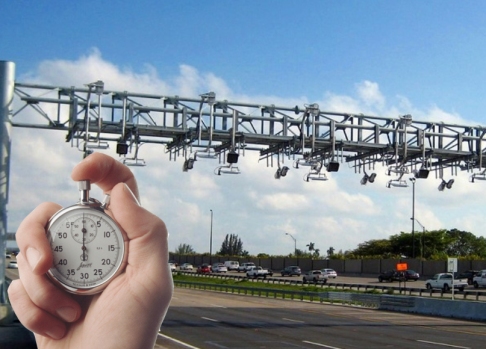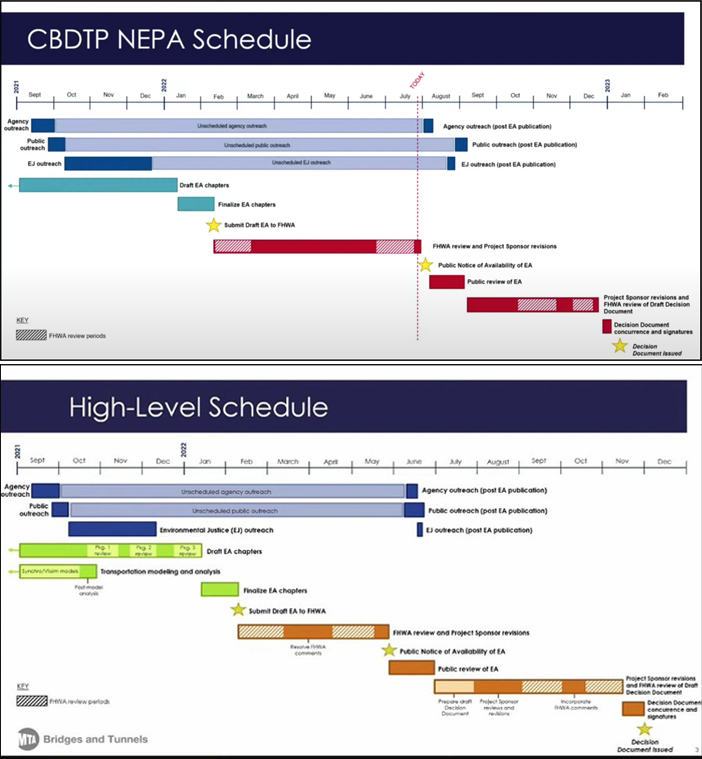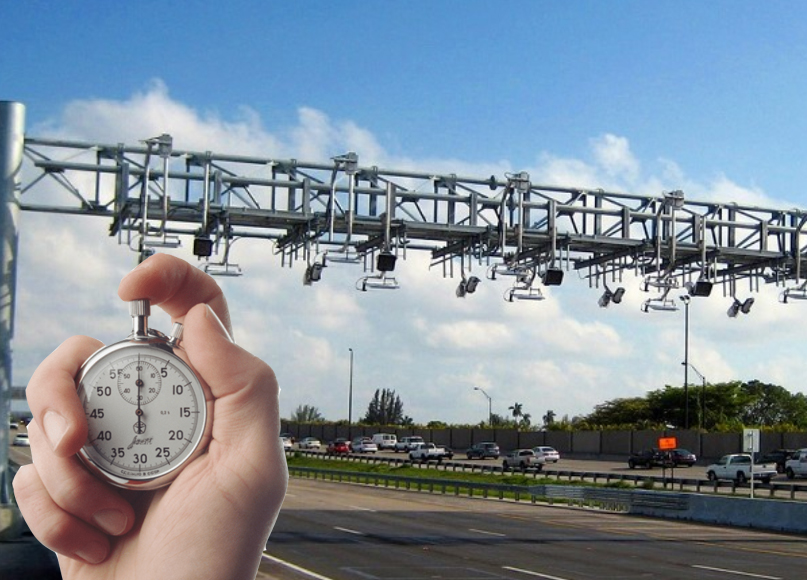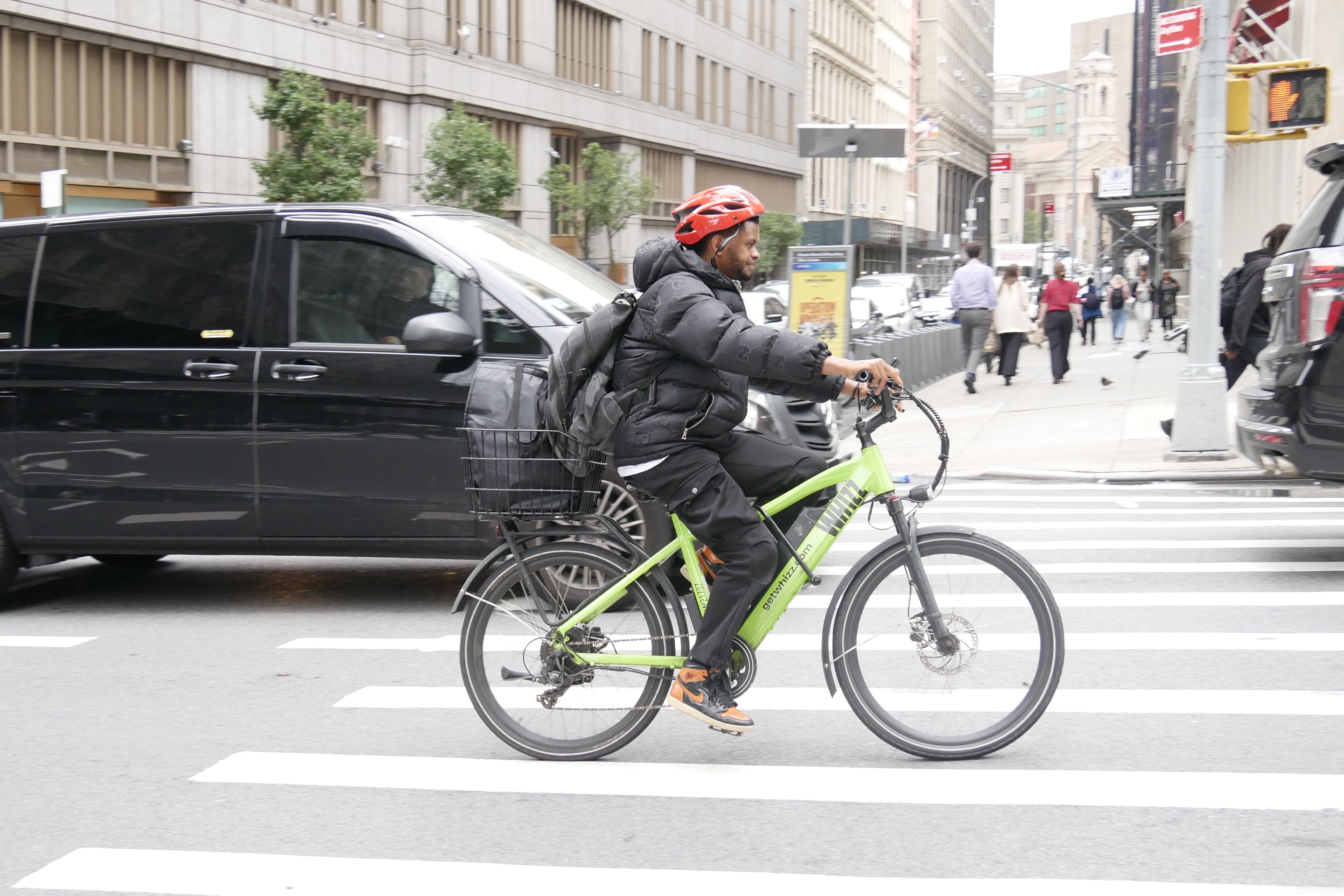
One roadblock down, plenty to go.
Congestion pricing took a step forward on Wednesday, with the MTA declaring that its environmental assessment will be released to the public this summer — a major benchmark in the federal oversight process that has seemingly been stuck in amber since the Trump administration began holding it up in 2020. But the good news also came with a sting: the newly announced timeline pushes back the final decision on the traffic toll from December 2022 to January 2023.
MTA Deputy Chief Operating Officer Allison de Cerreño announced the good news and also said that after the assessment was released that another week of public meetings would take place at the end of August, to allow public comment on the document.
“We anticipate we will have approval in the coming days to release the [environmental assessment] document on or about Aug. 10,” de Cerreño, who’s leading the MTA side of the environmental review, told the MTA Board on Wednesday. “At which point the formal comments period will begin.”
But after delivering her good news, de Cerreño also showed an updated schedule for the full environmental review, which showed that a final decision on the fate of congestion would be a month later than it already was under the original 18-month schedule:

The original high level schedule for congestion pricing placed the final decision on the environmental assessment in December 2022, but a delay on that has been telegraphed for some time now. In May, MTA CEO Janno Lieber said that the entire environmental review, which was supposed to be released in June, slowed down because the Federal Highway Administration responsed to the agency’s draft EA with over 400 technical questions, including demands to model how the congestion toll would affect traffic in the Philadelphia suburbs. By June, Lieber said that the MTA had lost somewhere in the realm of four to six weeks while grappling with the litany of questions from the federal government.
Although de Cerreño and Lieber were in a celebratory mood with the review process finally moving forward, there was some evidence the delay is going to cost the MTA. The agency revealed in its July financial update that instead of banking on $1 billion in revenue from congestion pricing in 2023, it’s now only counting on $250 million from the toll that year, followed by $1 billion in 2024 and 2025. Lieber suggested it was simply a correction that the agency hadn’t made earlier than July.
“The cash flow of the capital plan is such that we do not need the actual dollars from the congestion pricing bonds that will be issued until some time from now,” he said. “What we need to know is that the congestion pricing program will be in place so that we can award contracts that will then be funded over a number of years by those bonds. There is no impact at all to the capital program. That was an adjustment, frankly, that I think was overdue because we never thought we were going to start to get meaningful revenue from congestion pricing until the latter portion of 2023 and it was probably an error that we were carrying the whole full year amount in 2023.”
The MTA boss then clarified his initial characterization of the update as not fixing an error but “aligning” congestion pricing’s reality with what the MTA previously was hoping for. Still, watchdogs who’ve kept an eye on the 2020-2024 capital plan and have previously said that the plan is being funded at a slower pace than previous plans, said that whether the update is an alignment or a $750-million oopsie, it’s another piece of proof that congestion pricing delay has dragged the capital plan down.
“The MTA Capital Plan is historically behind, there is no doubt of that if you look at the numbers, as we did in our report,” said Reinvent Albany Senior Researcher Rachael Fauss. “And it matters even more for such a massive plan, since it has $55 billion worth of promises. COVID has been a factor for sure, but the lack of congestion pricing starting as envisioned in 2021 has slowed the rate of dollars coming in. The MTA has said congestion pricing funds are urgent — and we agree. But it can also be true that if they had those dollars sooner, the MTA’s capital plan would be in better shape.”
Rail birds
Also on the agenda at Wednesday’s board meeting, the MTA said it was finally empaneling the Traffic Mobility Review Board, the in-house panel tasked with recommending things like the toll price and any exemptions that might be granted to the toll. The MTA gets to appoint five of the six members of the panel, and picked a collection of big time machers who have either been involved with or influenced the agency in the past:
- Carl Weisbrod, chair of the board and former chairman of the New York City Planning Commission
- John Banks, president emeritus of the Real Estate Board of New York
- Scott Rechler, chairman of the Regional Plan Association and CEO of real estate company RXR
- Elizabeth Velez, president of construction company the Velez Organization and MTA Board member
- Kathryn Wylde, president and CEO of business lobby organization, the Partnership for New York City
Mayor Adams gets to appoint the sixth member, and a City Hall spokesman said the mayor “is working actively to finalize our nominee.”
The TMRB will not have meetings until after the public comment period on the environmental assessment is over, but in a press release the MTA said that putting the board together now will allow its members to “benefit directly from the public comment period, reviewing feedback as they learn and understand information provided by the CBDTP Team.”
Any future meetings of the TMRB will be subject to the state’s Open Meetings Laws and will, therefore, be held publicly. If and when the federal government signs off on the congestion pricing environmental assessment, the TMRB will issue a report explaining its recommendations on exemptions and toll prices, both of which are ultimately decided by the MTA Board.
The MTA also released the dates and times of the six environmental assessment public hearings. More information will be posted on the MTA’s congestion pricing website:
- Thursday, Aug. 25, 5 p.m. to 8 p.m.
- Saturday, Aug. 27, 10 a.m. to 1 p.m.
- Sunday, Aug. 28, 1 p.m. to 4 p.m.
- Monday, Aug. 29, 1 p.m. to 4 p.m.
- Tuesday, Aug. 30, 5 p.m. to 8 p.m.
- Wednesday, Aug. 31, 10 a.m. to 1 p.m.






